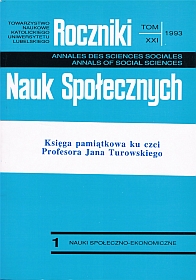Cognition − Action − the World of Ideas. The Foundations of Georg Simmel's Sociology
Abstract
Georg Simmel, a classic of sociology and modern philosophy, exerted a significant influence also in Poland, especially in the period before World War I.
Investigations into cognition are for him, contrary to some modern commentators' opinion, a necessary condition for a rationally formed sociology. The author of Grundfragen der Soziologie points out that the theory of cognition defines the main notions and conditions for research in particular branches of science. In this sense sociology cannot go without epistemological research.
Both the program and contents of the epistemological investigations by the author of Über soziale Differenzierung point to connections between the theory of cognition and sociology that are much deeper. Simmel has an evolutional, pragmatic and dynamic approach to cognition. Products of cognition, „the third state”, that result from historical development, play a fundamental role in the origin and functioning of society. In this way cognition is not only creation of the subject and object but also of society and culture. Hence investigations into cognition include all these fields. Cognition and action are inextricably connected. Their relation is that of mutual interaction (Wechselwirkung). That Wechselwirkung is also the starting point for all social forms. For Simmel it is exactly in interactions where the primary, elementary reality is formed. With such an approach to cognition sociology is a natural, or rather necessary, element of study of reality: the author of Soziologie talks about Erkenntnistheorie der Gesellschaft. Let us remind his conception of the sociological apriori's. From the conception of cognition also a program and range of research of social reality follow. Sociology is not a universalist science but a particular science studying a fragment of reality.
Copyright (c) 1993 Roczniki Nauk Społecznych

This work is licensed under a Creative Commons Attribution-NonCommercial-NoDerivatives 4.0 International License.


